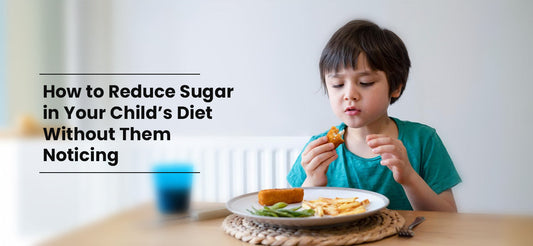The biggest worry of any parent is to ensure the health and well-being of kids. What concerns today’s parent is to make sure that children receive adequate nutrition. Nutrition in growing years plays a crucial role in kids' overall growth and development. While a balanced diet is ideal, certain circumstances may lead to gaps in essential nutrients. Factors such as picky eating habits, dietary restrictions, or busy lifestyles can sometimes hinder children from getting all the vitamins and minerals they need from food alone. In such cases, multivitamin supplements are recommended to fill the potential nutritional gaps. But first let us see how vitamins and minerals are essential for children's growth, development, and overall health.
Vitamins and Minerals for Kids
|
Vitamins & Minerals |
Benefits |
|
Vitamin A
|
Important for vision, immune function, and skin health. It also plays a role in cell growth and differentiation. |
|
RIBOFLAVIN (vitamin B2) |
Play various roles in energy metabolism, nerve function, and red blood cell production. They are also important for brain development and function |
|
Vitamin B6 |
|
|
Vitamin B12 |
|
|
ASCORBIC ACID |
Supports the immune system, helps with wound healing, and aids in iron absorption. It's also an antioxidant that helps protect cells from damage. |
|
Vitamin D |
Essential for bone health as it helps the body absorb calcium. It also plays a role in immune function and may have other health benefits. |
|
FOLIC ACID |
supports proper growth, DNA synthesis, and red blood cell formation, aiding in overall development and preventing neural tube defects. |
|
CALCIUM |
Critical for bone and teeth development and maintenance. It also plays a role in muscle function and nerve signaling. |
|
IODINE |
Essential for thyroid hormone production, which regulates metabolism and supports growth and development. |
|
IRON |
Essential for making hemoglobin, the protein in red blood cells that carries oxygen to tissues. Iron is crucial for preventing anemia and supporting cognitive development. |
|
MAGNESIUM |
Necessary for muscle and nerve function, energy production, and bone health. It also helps regulate blood sugar levels and blood pressure. |
|
ZINC |
It is important for immune function, wound healing, and growth and development. Zinc also supports normal appetite and taste sensation. |
Reason to choose kids' multivitamins:
- Nutritional Gaps: Children may not always get all the essential nutrients they require from their diet alone. Picky eating habits, food preferences, and limited food choices can lead to nutritional gaps. Multivitamins act as a supplement to fill these gaps and ensure children receive a broad spectrum of vitamins and minerals.
- Supporting Growth and Development: Growing bodies require a variety of nutrients for proper development. Multivitamins provide essential vitamins and minerals that are crucial for bone health, cognitive development, immune function, and overall growth. Adequate nutrition during childhood lays the foundation for a healthy and thriving adulthood.
- Immune System Support: Vitamins like vitamin C, vitamin D, and zinc play a vital role in supporting the immune system. Especially in times when exposure to illnesses is common, multivitamins can contribute to strengthening a child's immune defences, helping them better fight off infections.
- Cognitive Function: Certain vitamins, such as B vitamins and omega-3 fatty acids, are known to support cognitive function and brain development. Multivitamins with these nutrients can aid in maintaining optimal cognitive abilities, concentration, and memory.
- Energy Levels: B group of vitamins are essential for converting food into energy. Ensuring an adequate intake of these vitamins through multivitamins can help support a child's energy levels, which is crucial for their active lifestyle and participation in various activities.
- Bone Health: Vitamins like vitamin D and calcium are vital for strong and healthy bones. Multivitamins can contribute to bone development and help prevent deficiencies that may impact bone health.
- Convenience and Consistency: Multivitamins provide a convenient and consistent way to supplement Kids' diets, offering reassurance to parents that their children are getting the nutrients they need.
- Preventing Deficiency-Related Issues: Multivitamins act as a preventive measure, reducing the risk of conditions associated with nutrient deficiencies, such as anaemia or vitamin D deficiency.
Also, when considering multivitamins for children, it's important to consult with a healthcare professional to determine specific needs and appropriate supplementation. While multivitamins can be beneficial, they should complement a balanced and varied diet rather than replace it.
Tips for parents to make kids' multivitamin consumption a fun activity
Making kids' multivitamin consumption a fun activity can encourage regular intake. Here are some tips for parents:
- Choose Fun Shapes and Colours:
- Involve Them in Selection:
- Turn it Into a Game:
- Create a Reward System:
- Mix with Favourite Foods:
- Set a Positive Example:
- Create a Routine:
- Educate in a Fun Way:
- Make it a Celebration:
- Use Character-Themed Vitamins:
Remember, the key is to make the experience positive and enjoyable so that kids view taking multivitamins as a fun and beneficial part of their routine.








